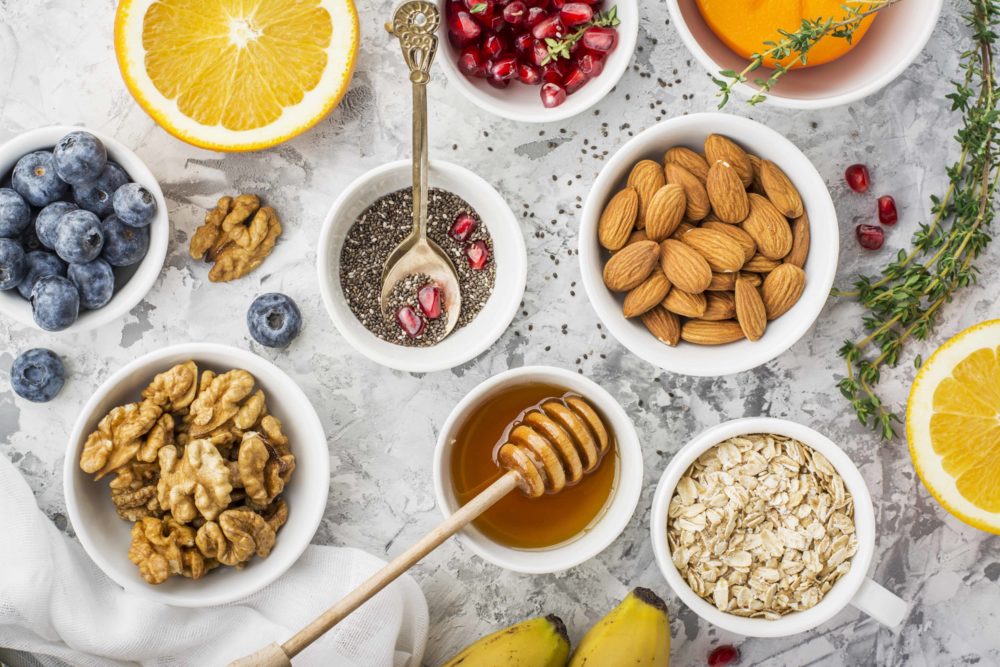As finals approach, we’ve got you covered with a guide to the best study snacks out there. The best study snacks improve our cognition, memory, and performance.
This brain food will energize you, keep you full, and help you stay focused — plus it’s portable for those late nights at the library.
The Good, the Bad, and the Ugly
We’ll get to the good, but let’s start the bad and the ugly. Here’s what you’ll want to avoid during your study session:
- Refined grains: These low-quality carbohydrates have been stripped of all the good stuff. Your body will release a load of insulin to metabolize these carbs so you’ll experience a noticeable slump.
- Refined sugar: Another low-quality carb, refined sugar will make your blood sugar levels spike and crash.
- Unhealthy fats: Trans fats and saturated fats will raise your cholesterol levels and cause inflammation.
Essentially, steer clear of the school vending machines. If you want to retain all the information on both sides of the flashcards, you’ll have to snack smarter.

Also, keep in mind that the amount of food you eat matters. It takes a lot of energy to digest the food you put into your body, so eat too much and you’ll end up in a food coma. But if you don’t eat enough, you’ll be distracted by a rumbling tummy and hangry attitude. Plus, your low blood sugar levels will have you feeling listless.
To avoid that yucky, groggy feeling of being poorly fed and poorly prepared for class, here’s what to look for instead.
- High-quality carbs: We do need carbs — and quality does matter. Whole foods provide good carbs packaged with other nutrients that our bodies convert to glucose, the energy source that literally fuels the brain.
- Lean protein: The neurons in our brains are mostly made of fat, but protein makes the connections. They also deliver amino acids, which can encourage better cognitive performance and help us stay full.
- Antioxidants: Literally anti-oxidants, these work against the oxidative stress caused by free radicals, volatile atoms linked to brain dysfunction that attack healthy molecules in search of an electron. Antioxidants take one for the team and hand off an electron, keeping our gray matter safe.
- Healthy fats: Monounsaturated and polyunsaturated fats provide long-lasting energy, keep us feeling full, and help us digest essential fat-soluble vitamins.
In general, nutrient-dense foods and whole foods — rather than processed snacks — should be your top picks.
A+ Study Snacks
Whether you’re looking for the best snacks for kids, for college, or for work, here are four smart snacking categories.
Something Sweet
Sweeten up your study sesh with whole or dried fruits. Try berries, apples, bananas, oranges, and grapes for a fresh burst of flavor and energy. Enjoy dried fruits like raisins, banana chips, and dried apricots on their own or in a trail mix.

Dark chocolate also makes the nutritional “nice” list. It contains the electrolyte magnesium plus flavanols that’ll help keep your blood pressure levels down. A single square can help you feel satiated so you’re not tempted to binge.
Something Savory
For protein, opt for a few cubes or slices of low-fat cheese or a hard-boiled egg. Or, bring along a packet of tuna or salmon, and a fork to scoop out all the healthy fats and protein.
Don’t forget raw vegetables — broccoli florets, which contains antioxidants, and avocados, which are a quality source of monounsaturated fats, both make great study snacks. Celery sticks, baby carrots, sliced bell peppers or cucumbers, and cherry tomatoes are just as easy to prep and pack.
Let’s get into the legumes. Edamame — a complete protein with all the essential amino acids your body needs — can be an alternative to those little round candies you can’t stop eating.
Something Creamy
There’s also that other lovely legume, the chickpea. Pack some hummus and use those raw veggies to dunk, dip, and scoop out >all the nutritional goodness to your taste buds’ delight.
For an even creamier flavor, opt for low-fat yogurt or cottage cheese. All of these options play well with other study snacks.

Or, reach for a jar of nut butter. Peanut, almond, or cashew — whichever butter you love better, you’ll be filling your tank with protein, healthy fats, and micronutrients.
Something Crunchy
You can also enjoy nuts in their crunchy forms. Unsalted peanuts and tree nuts, along with seeds, are full of healthy fats and protein that will help you power through.
Plain popcorn is another bite-sized study snack to bring along. Low-fat, low-sodium popcorn is rich in fiber and antioxidants. It’s a whole grain that will keep you feeling full. Try sprinkling with nutritional yeast for some added umami-packed B vitamins, minerals, and protein.
Finally, satisfy your crunch cravings with whole-grain crackers and chips. Look for low-sodium, low-fat baked options. Whole-grain bread and tortillas are good choices, too.
Mix-and-Match for Smart Snacking
Now that you’ve got these four categories down, get creative! Stock your (mini)fridge and pantry so you can mix and match across the crunchy, creamy, sweet, and savory spectrums.
You could dunk baby carrots into a low-fat Greek yogurt dip, pack a hard-boiled egg with a few cubes of low-fat cheese and cherry tomatoes, or use almond butter and dried cranberries in a new variation of ants on a log.
Or, how about grabbing a piece of fresh fruit and your favorite Perfect Bar before you hit the books?
Packed with over 20 superfoods and whole-food protein, our perfectly delicious flavors tick all the creamy, crunchy, sweet, and savory boxes. A treat for your taste buds, they’ll have your brain shouting, “let’s do this!” after just a few bites.
Stash some in the fridge and pop one into your backpack when you head out. You can enjoy it at room temperature all through finals week. (But, let’s be honest, it’ll be gone by Monday.)



